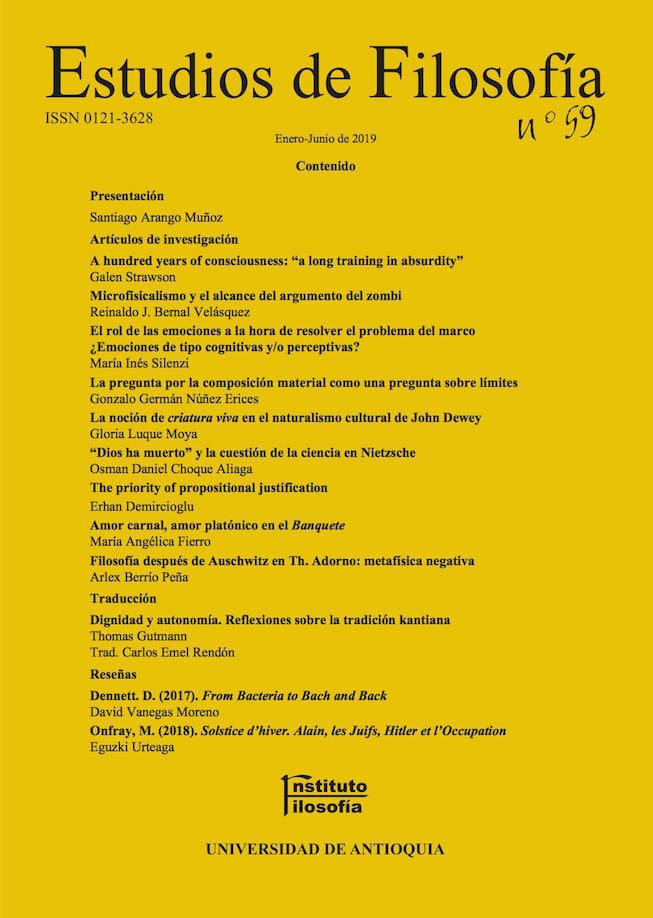Philosophy after Auschwitz in Th. Adorno: negative metaphysics
DOI:
https://doi.org/10.17533/udea.ef.n59a10Keywords:
barbarism, philosophy, Auschwitz, metaphysics, negative dialecticsAbstract
This article is based on Adorno’s reflections on a new idea of philosophy developed in Negative Dialectics, specifically in the section “Meditations on Metaphysics”. In this passage, the author develops a critique of the categories of traditional metaphysics that serve as the basis for the philosophical proposal of the Enlightenment, both in Kant and Hegel. Adorno considers that philosophy has been an accomplice of barbarism in history. In this way, Auschwitz as a new category of analysis and metaphorical expression of irrationality and barbarism that destroys the human and the natural environment, allows the exercise of reflection. For this reason, for Adorno it is urgent to rethink philosophy after Auschwitz to prevent new forms of terror from repeating themselves. A new idea of metaphysics with a horizon of understanding,intervention, transformation and resignification is put forward. In short, a negative metaphysics that is directed towards what has been discarded by the traditional rationality.
Downloads
References
Adorno, Th. (1975): Dialéctica Negativa (J. M. Ripalda, Trad.). Madrid: Taurus.
Barahona, E. (2006): Categorías y modelos en la Dialéctica Negativa de Th. W. Adorno: crítica al pensamiento idéntico. Logos. Anales del Seminario de Metafísica, 39, 203-233.
Buck-Morss, S. (1981): Origen de la Dialéctica Negativa: Theodor W. Adorno, Walter Benjamin y el Instituto de Frankfurt. Bogotá: Siglo veintiuno.
Brull, R. (2007): La Dialéctica Negativa en Adorno: aplicación a la teoría social (Tesis de Doctorado para optar al título de Doctor en Filosofía). Facultad de Filosofía Universitat de Valencia, Valencia, España.
Cho, D. (2009): Adorno on Education or, Can Critical Self-Reflection Prevent the Next Auschwitz? Historical Materialism, 17, 74-97.
Escuela, C. (2007): El esfuerzo de Munchhausen: Dialéctica adorniana del concepto. En M. Cabot (Ed.), El pensamiento de Th. W. Adorno: balance y perspectiva (pp. 97-103). Palma:Ediciones UIB.
Habermas. J. (1975): Perfiles filosóficos-políticos (M. Gimenez, Trad.). Madrid: Taurus.
Honneth, A. (2009): Patologías de la razón. Historia y actualidad de la Teoría Crítica (G. Márcico, Trad.). Buenos Aires: Katz Editores.
Jameson, F. (2010): Marxismo tardío: Adorno y la persistencia de la dialéctica (M. de Ruschi, Trad.). Buenos Aires: Fondo de cultura económica.
Jarvis, S. (2006): Adorno: Marx, Materialism. En Tom Huhn (Ed.), the Cambridge Companion to Adorno (pp. 79-100). Cambridge: Cambridge University Press.
Kant, E. (1997): Crítica de la razón pura (P. Ribas, Trad.). Buenos Aires: Santillana.
Peleato, M. (2007): Dialéctica de la Identidad: De la identificación a la identidad racional. En M. Cabot (Ed.), El pensamiento de Th. W. Adorno: balance y perspectiva (pp. 87-95). Palma: Ediciones UIB.
Teimil, I. (2007): Emancipación y potencial constructivo del concepto en la Dialéctica Negativa de Adorno. En M. Cabot (Ed.), El pensamiento de Th. W. Adorno: balance y perspectiva (pp. 79-86). Palma: Ediciones UIB.
Wellmer, A. (1996): Finales de partida: la modernidad irreconciliable (M. Jiménez, Trad.). Madrid: Frónesis.
Zamora, J. (2010): Filosofía después de Auschwitz. En O. Nudfer (Ed.), Filosofía de la filosofía (pp. 173-213). Madrid: Trotta.
Published
How to Cite
Issue
Section
Categories
License
Copyright (c) 2019 Arlex Berrio Peña

This work is licensed under a Creative Commons Attribution-NonCommercial-ShareAlike 4.0 International License.
Authors who publish with this journal agree to the following terms:
1. The Author retains copyright in the Work, where the term "Work" shall include all digital objects that may result in subsequent electronic publication or distribution.
2. Upon acceptance of the Work, the author shall grant to the Publisher the right of first publication of the Work.
3. The Author shall grant to the Publisher a nonexclusive perpetual right and license to publish, archive, and make accessible the Work in whole or in part in all forms of media now or hereafter known under a Creative Commons Attribution-NoCommercia-ShareAlike (CC BY-NC-SA 4.0), or its equivalent, which, for the avoidance of doubt, allows others to copy, distribute, and transmit the Work under the following conditions: (a) Attribution: Other users must attribute the Work in the manner specified by the author as indicated on the journal Web site;(b) Noncommercial: Other users (including Publisher) may not use this Work for commercial purposes;
4. The Author is able to enter into separate, additional contractual arrangements for the nonexclusive distribution of the journal's published version of the Work (e.g., post it to an institutional repository or publish it in a book), as long as there is provided in the document an acknowledgement of its initial publication in this journal;
5. Authors are permitted, and Estudios de Filosofía promotes, to post online the preprint manuscript of the Work in institutional repositories or on their Websites prior to and during the submission process, as it can lead to productive exchanges, as well as earlier and greater citation of published work (see The Effect of Open Access). Any such posting made before acceptance and publication of the Work is expected be updated upon publication to include a reference to the Estudios de Filosofía's assigned URL to the Article and its final published version in Estudios de Filosofía.















